Article's Content
I’ve said it before and I’ll say it again: AI has revolutionized the workforce, digital marketing in particular. Some fiercely oppose it, refusing to jump on the AI bandwagon, while others have fully embraced it, allowing AI to handle the bulk of their workload.
Here’s my view on AI: I view it as simply a tool. A powerful one at that. It saves time, boosts productivity, enhances efficiency, provides quick information, and helps overcome writer’s block.
With that perspective, I’ve spent this past year deeply experimenting with different AI tools. I’ve personally witnessed their transformative impact on digital strategies.
AI-powered content writing tools, in particular, have become indispensable. They not only expedite content creation but also streamline keyword research and categorization, making them invaluable assets for marketers looking to optimize their SEO strategies.
In this article, we explore how AI content writing tools can be seamlessly integrated into SEO strategies. We’ll discuss 11 powerful tools that can significantly boost your AI SEO ROI, along with practical tips on maximizing their effectiveness within your workflow.
We also checked review sites like G2 and Capterra to bring you customer reviews and pricing options. Lets dive in!
The Best AI Tools for SEO
1. Surfer SEO
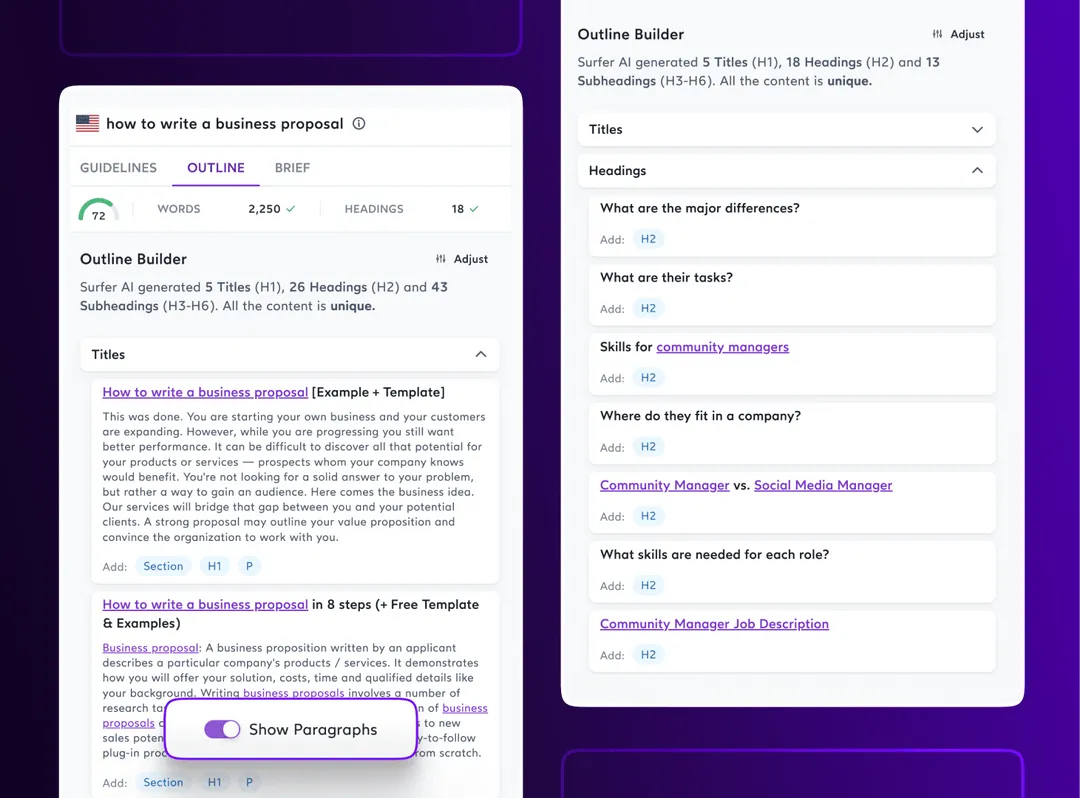
Surfer SEO is a powerful tool designed to help create and enhance SEO content. It can analyze over 500 on-page signals in one scan, making it highly effective for SEO professionals.
Unlike some AI tools, Surfer SEO prioritizes search intent and SEO optimization, seamlessly integrating article creation and optimization processes.
It offers a free version for users to explore before committing to a paid plan, and integrates well with platforms like Jasper for real-time content optimization during creation.
Pricing: Surfer AI offers flexible pricing tiers tailored to different business needs: Essential at $89 per month for small business owners and freelancers, Scale at $129 per month for mid-sized agencies and marketing teams, Scale AI at $219 per month for agencies looking to scale up with AI, and Enterprise with custom pricing for large agencies and marketing teams.
Reviews: Users say that Surfer SEO has powerful capabilities for analyzing on-page signals and effective integration of article creation and optimization processes. However, some users find the learning curve steep for new users.
2. Jasper
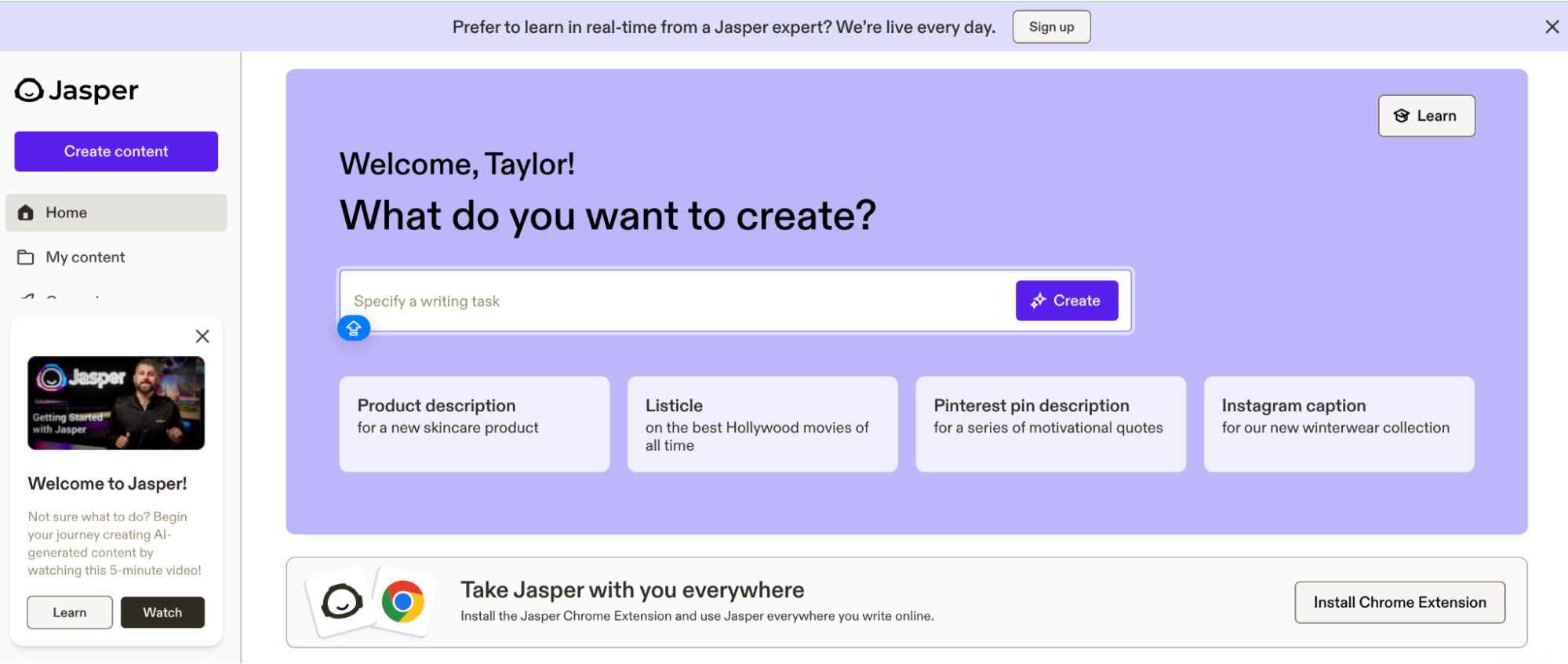
Jasper offers advanced AI capabilities, integrating target keywords seamlessly for enhanced content relevance and value. It automates tasks and streamlines project management for enterprise campaigns, ensuring efficient content revisions.
In content creation, Jasper produces high-quality, SEO-friendly material across blogs, product descriptions, and social media. It optimizes meta descriptions and title tags to boost SERP click-through rates, emphasizing readability and user experience aligned with search algorithms.
Businesses can scale content production effectively without compromising quality, supported by Jasper’s analytics for actionable insights and improved ROI in large-scale marketing efforts.
Pricing: Jasper offers three pricing tiers: Creator at $39.00/month for AI content creation and enhancement across all online platforms, Pro at $50.00/month for advanced content creation and multi-brand campaigns, and Business with custom pricing based on business needs.
Reviews: Jasper efficiently incorporates target keywords into content and offers strong analytics tools for deep insights into content performance. Some users mention that pricing may be higher compared to competitors.
3. AlliAI
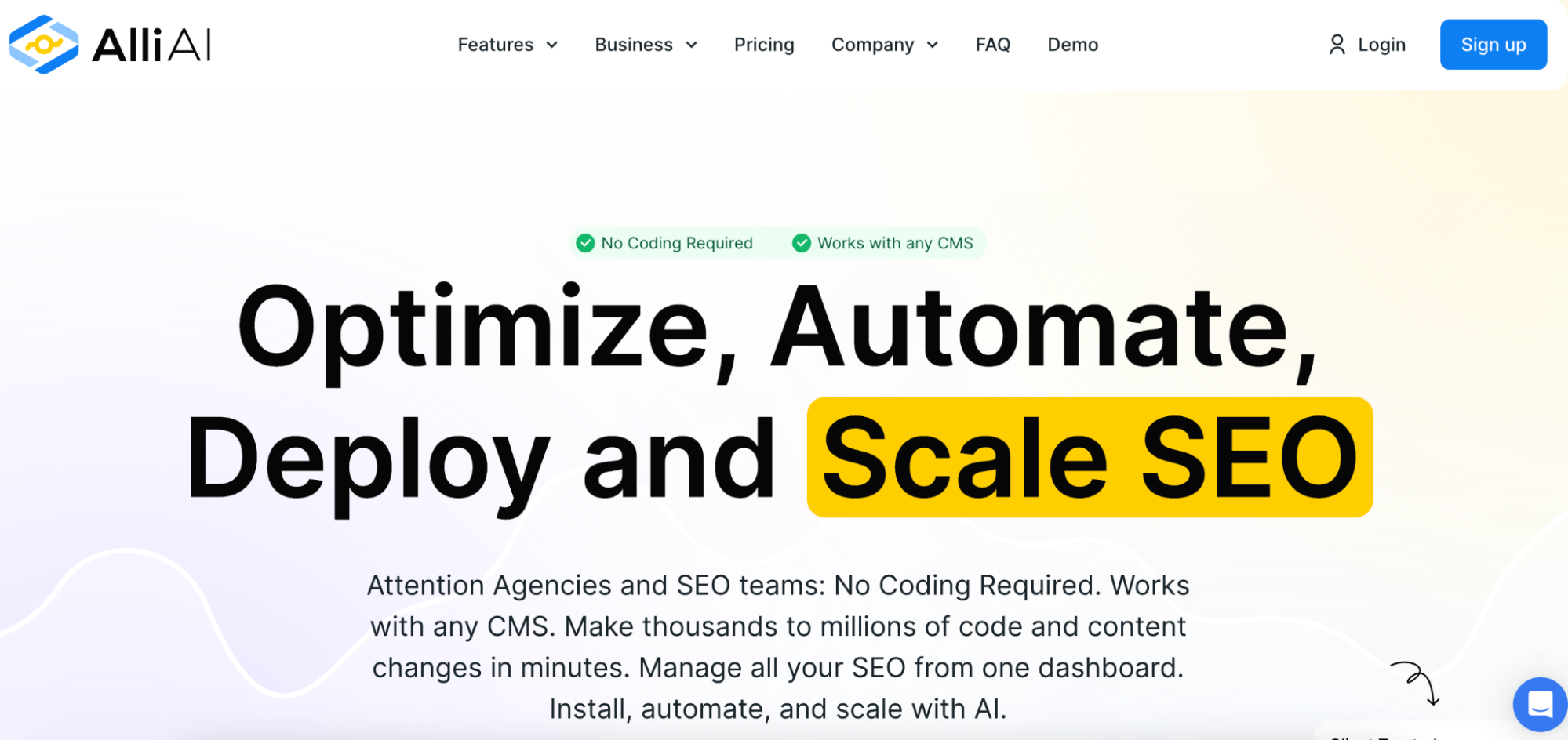
Alli AI stands out as a powerful AI-driven SEO solution tailored to elevate website visibility on the SERPs. Designed to seamlessly integrate with any CMS, it optimizes every aspect of website code to enhance performance.
Key features of Alli AI include on-page and content optimizations, technical enhancements, and comprehensive outreach and backlink analysis tools. Its Bulk Onpage Optimization feature establishes site-wide optimization rules and implements code adjustments across individual pages swiftly.
To gain a competitive edge in the digital landscape, Alli AI analyzes inter-site relationships, content relevance, and search engine rankings.
Pricing: Alli AI offers scalable On-Page SEO solutions across three tiers: Business ($299/month), Agency ($599/month), and Enterprise ($1,199/month). Each plan includes features like site limits, team members, keywords, pages, and additional AI services, with customization and extra services available at additional costs.
Reviews: AlliAI excels in comprehensive on-page and content optimizations, along with effective technical enhancements and backlink analysis. However, the interface may be less intuitive for some users.
4. SEMrush
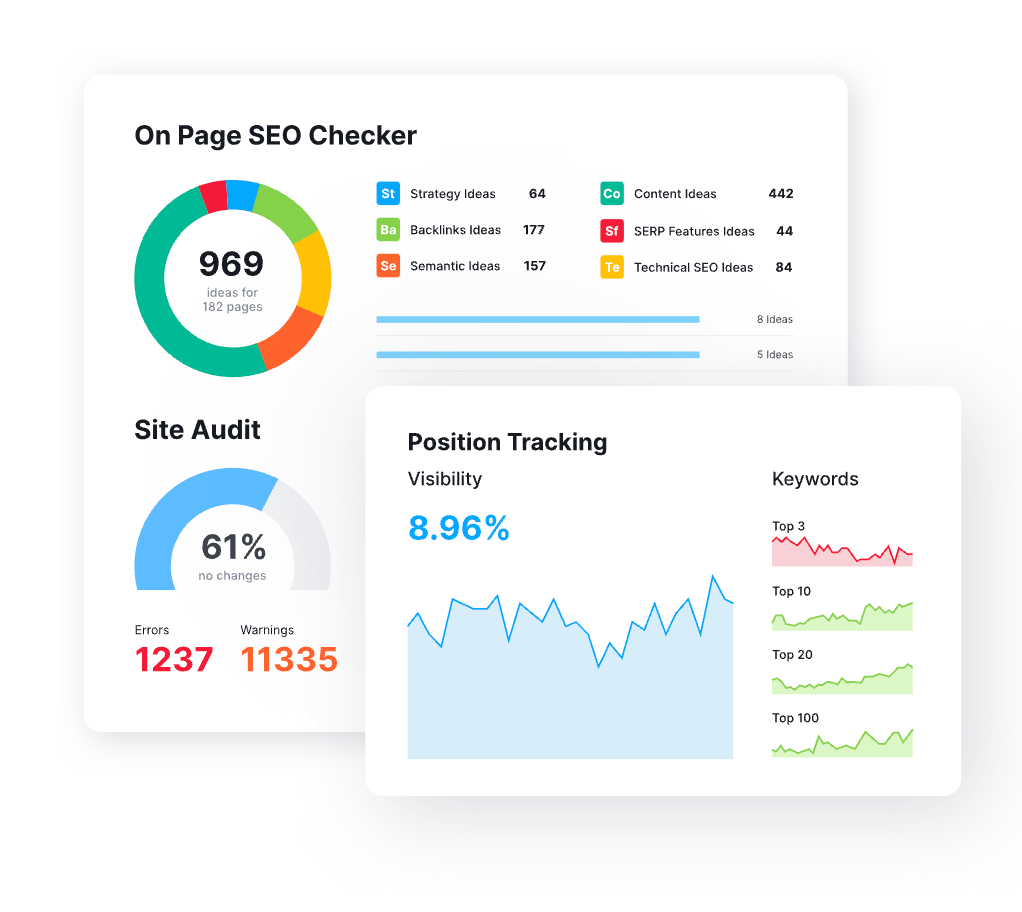
Semrush is a staple in the toolkit of nearly every SEO professional globally, renowned for its expansive array of SEO functionalities enhanced by AI. Here’s how Semrush leverages AI to empower digital marketers:
- Keyword Trend Insights: Semrush uses AI to analyze keyword trends, helping marketers identify emerging search patterns and opportunities.
- Content Ideation: It generates creative content ideas based on audience interests and SEO goals, enabling engaging content creation.
- On-Page Optimization: AI optimizes meta tags, headings, and content structure to enhance search engine visibility and user experience.
- Backlink Analysis: AI-powered tools identify high-quality links and potential risks to boost domain authority and search rankings.
- Ranking Recommendations: Provides actionable AI-driven insights to improve website rankings, content relevance, and user engagement.
Pricing: SEMrush offers three plans: Pro at $129.95/month for small teams with 5 projects and 500 tracked keywords; Guru at $249.95/month for agencies with 15 projects and 1,500 tracked keywords, including advanced features; and Business, with custom pricing for large agencies and enterprises, offering 40 projects and 5,000 tracked keywords, plus additional advanced tools like Share of Voice and API access.
Reviews: SEMrush offers extensive functionalities for keyword trend analysis, content ideation, and robust on-page optimization. It’s noted for strong backlink analysis capabilities, though pricing might be high for smaller businesses.
5. Frase
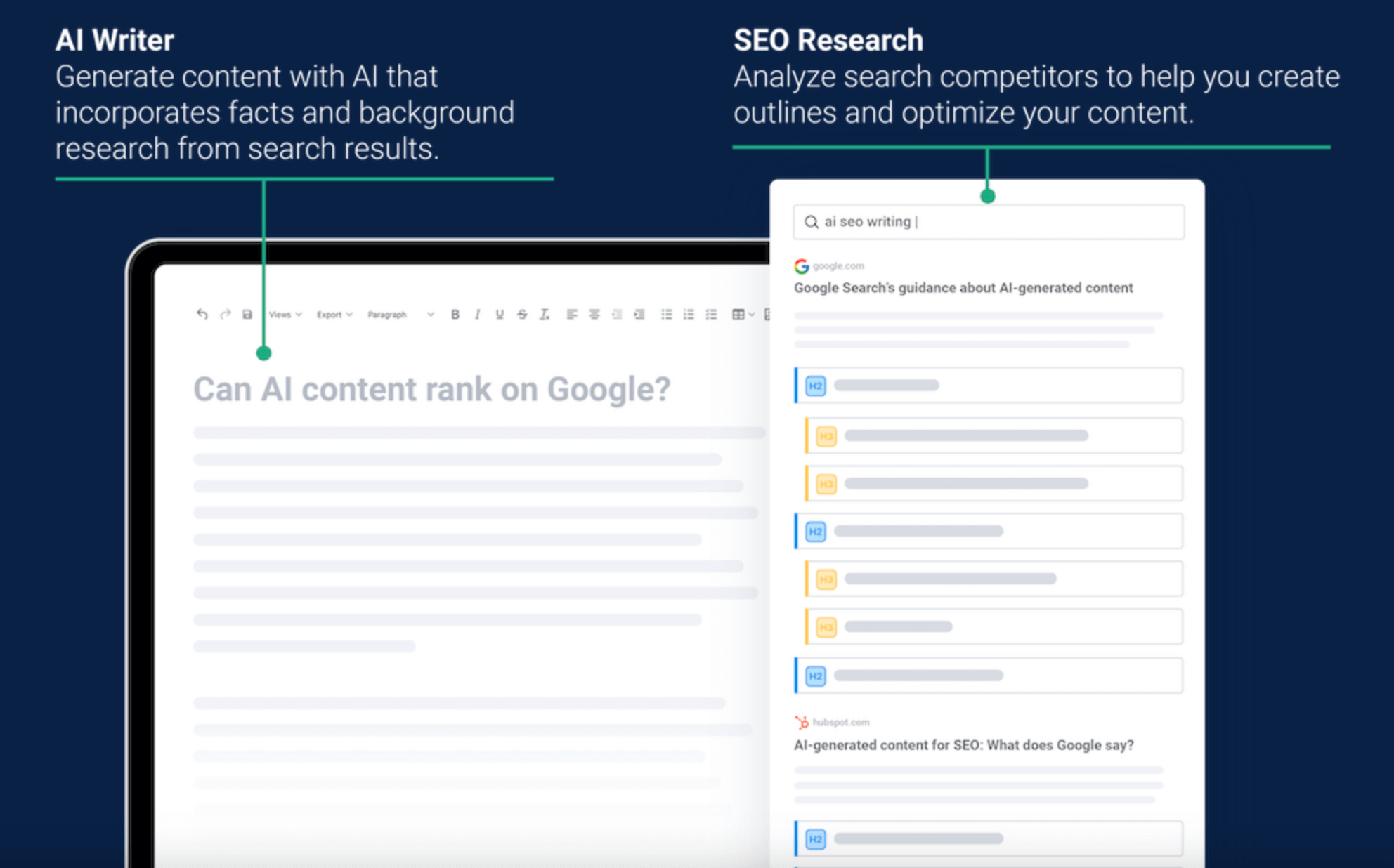
Frase uses AI to optimize content for SEO, offering tools that streamline content creation. For example, it generates detailed content briefs and suggests engaging questions to enhance audience interaction and SEO performance.
In addition to content creation, Frase provides comprehensive SEO tools, including keyword research and optimization tools. These tools assist users in identifying relevant keywords to target, improving content visibility and search engine rankings.
Frase also offers predictive insights into content performance in search engine results. Using historical data and current trends, Frase helps marketers forecast content performance, resulting in better SEO outcomes.
Pricing: Frase offers a Free Trial with no cost and includes 1 user and 1 search query. The Solo plan is $15/month ($12/month annually) for 1 user with 10 search queries. The Basic plan costs $45/month ($38/month annually) for 1 user with 30 search queries. The Team plan is $115/month ($97/month annually) for 3 users with unlimited search queries, with additional users at $25/month each.
Reviews: Frase is praised for its tools in content creation, keyword research, and predictive insights, effectively enhancing SEO performance. However, some users find that AI-generated content may require additional editing.
6. Diib
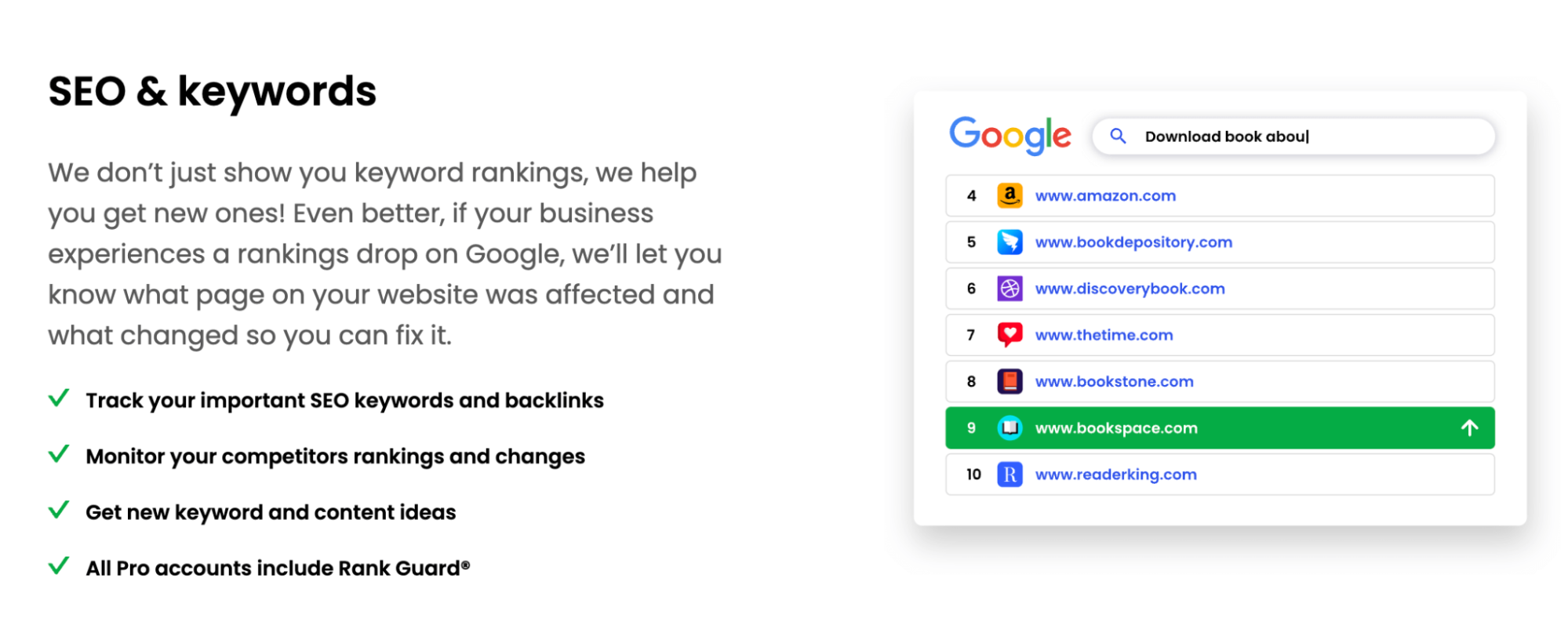
Diib’s growth plan seamlessly integrates with Google Analytics, leveraging advanced algorithms to provide a straightforward strategy. It analyzes your website, competitors, and industry benchmarks, offering valuable insights for online growth.
Diib’s Answer Engine merges real-time analytics with detailed site and competitor analysis, delivering rapid, actionable growth suggestions in just 54 seconds. Users appreciate its intuitive interface and practical insights, enhancing SEO, site speed, security, and overall user experience. This design empowers businesses to make informed decisions with impactful results.
Pricing: Diib offers a Free Self-service plan with limited features including website monitoring, keyword explorer, and backlink analysis. Their Pro plan, priced at $14.99/month, provides unlimited access to advanced growth tools like robust website monitoring, full keyword and backlink analysis, competitor tracking, and enhanced support options including email, phone, and chat support, along with weekly snapshots and a daily Health Score algorithm.
Reviews: Diib integrates seamlessly with Google Analytics for comprehensive growth strategies and quick insights through its Answer Engine. Some users report occasional discrepancies in data accuracy.
7. INK
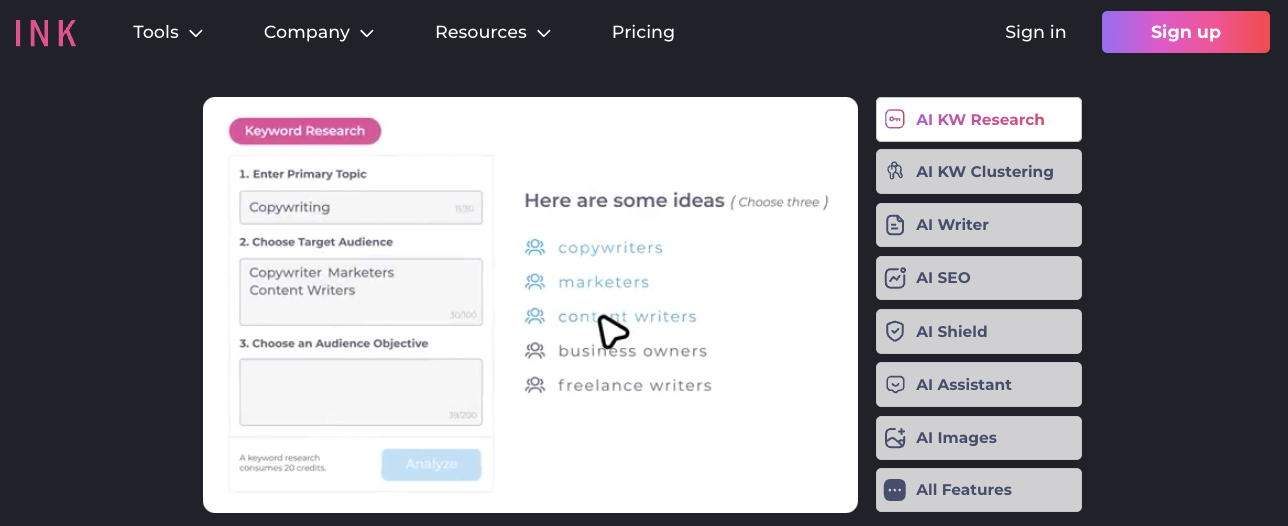
INK is an all-in-one SEO platform with AI writing and an intelligent SEO assistant. It creates content tailored to specific keywords using current trends and competitor insights to boost search engine rankings.
The AI-powered SEO assistant optimizes content for better rankings and user engagement. Through real-time audience research, it facilitates conversion-focused copywriting, effectively turning visitors into loyal customers.
INK also includes a content shield to protect your brand from AI-generated content issues, ensuring reputational integrity.
Pricing: INK offers a Professional plan at $39/month with unlimited AI writing, SEO articles, AI images, and access to all apps and features including keyword research and over 130 AI templates. Their Enterprise plan, priced at $99/month, includes advanced team management, team performance tracking, and premium support, with a 5-day free trial available for both plans without needing a credit card.
Reviews: INK’s AI-powered SEO assistant effectively enhances content optimization and user engagement through real-time audience research. However, users note that content recommendations may lack customization options.
8. NeuronWriter
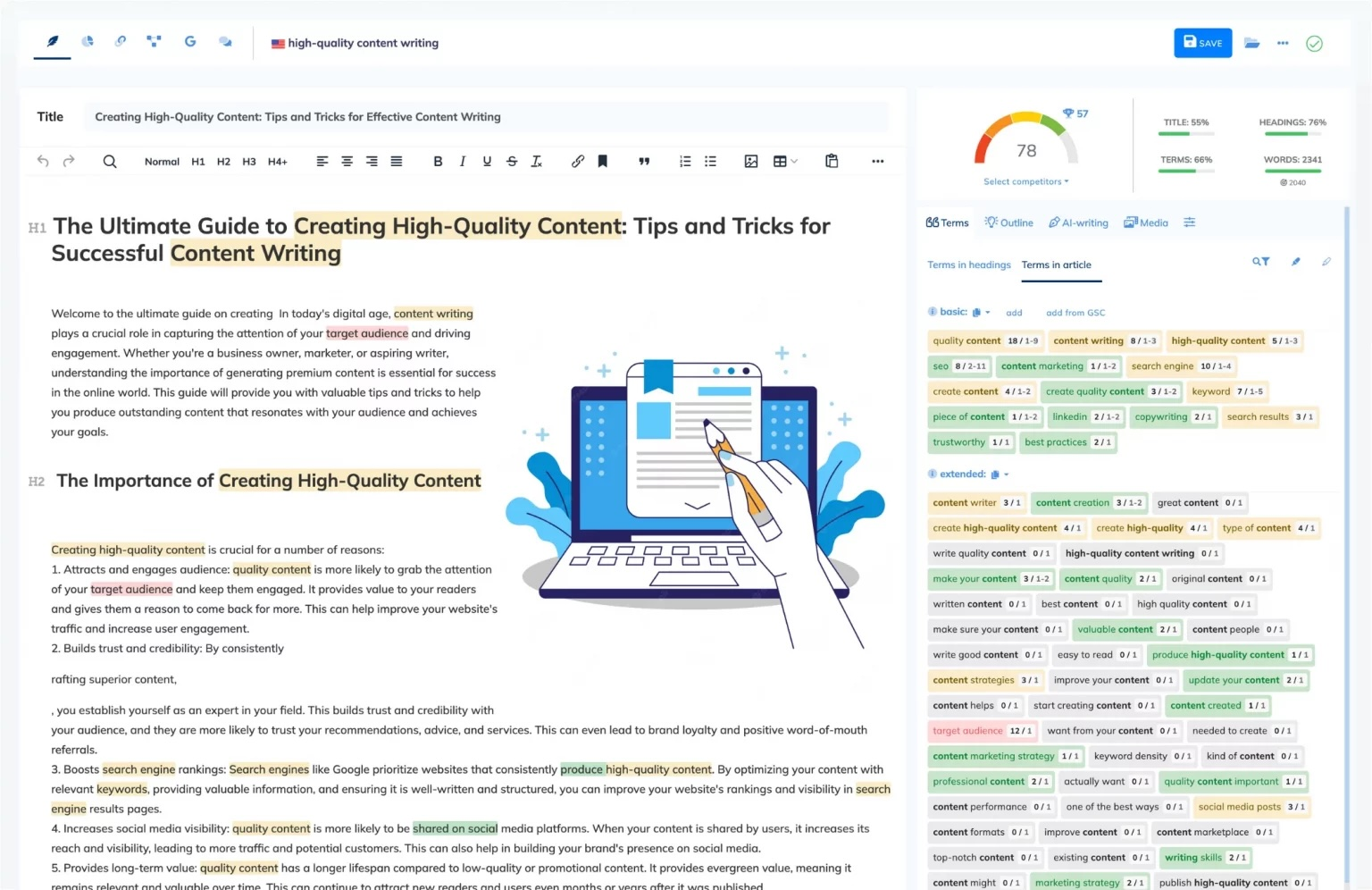
NeuronWriter is an advanced AI tool for SEO that enhances content delivery by synthesizing data from Google SERPs, competitor insights, and natural language processing (NLP) to create targeted content aligned with specific keywords.
NeuronWriter is based on OpenAI’s GPT model, allowing it to not only create content but also automate the writing process and optimize it for search engines, seamlessly integrating with platforms such as WordPress and Google Search Console.
Pricing: NeuronWriter offers multiple plans: Bronze Plan at $23/month, Silver Plan at $45/month, Gold Plan at $69/month, Platinum Plan at $93/month, and Diamond Plan at $117/month. Each plan varies in the number of projects, content writer analyses, and AI credits included, catering to different business sizes and needs.
Reviews: NeuronWriter uses OpenAI’s GPT model for advanced content creation and SEO optimization, integrating well with popular platforms. Some users suggest it may require manual adjustments for nuanced content.
9. WordLift
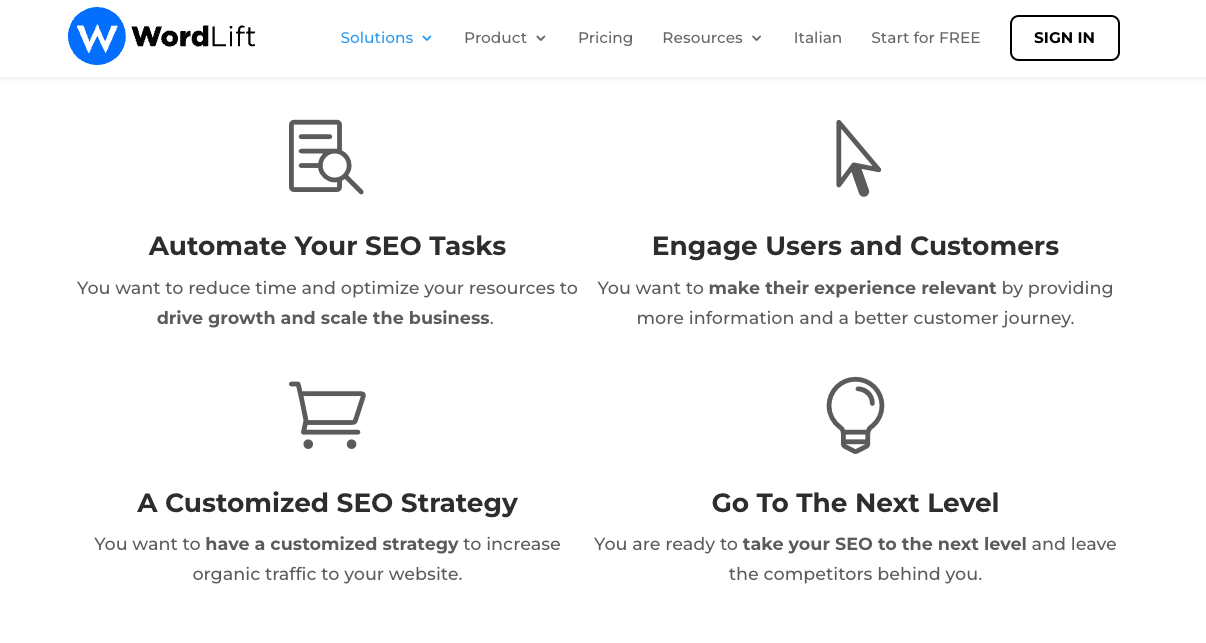
With WordLift, you can transform content into a structured format that is highly favored by search engines, particularly Google, to maximize SEO value.
This tool automates digital marketing tasks, enhancing website visibility through features like the Knowledge Graph, which aids search engines in understanding content structure.
WordLift also offers a content recommendation system that suggests relevant products based on user guidelines and tone of voice, ensuring consistency in reader experience.
Pricing: Professional at €79/month billed yearly, Business at €199/month billed yearly, and Enterprise with custom pricing. Each plan includes a different number of Knowledge Graphs, URLs, and interactions with additional options available for extra features like Knowledge Graphs and URLs.
Reviews: WordLift transforms content into structured formats favored by search engines and enhances visibility through its Knowledge Graph feature. However, initial setup and configuration can be time-consuming.
10. Munch

Munch AI enables the easy conversion of written content into engaging videos across platforms such as YouTube and TikTok, enabling the increasing presence of video content in search results.
Using AI, Munch extracts compelling clips from long-form videos to create impactful content that not only enhances engagement but also enables precise control over monetization. Insights into content performance empower data-driven decisions when formulating content strategy.
Pricing: Munch’s pricing details are not readily available on their website, however, according to SourceForge, Munch’s pricing status at $49.00 per month.
Reviews: Munch is highly praised for its AI-driven video creation capabilities, enhancing engagement across platforms like YouTube and TikTok. However, pricing information requires direct inquiry.
11. HubSpot AI Search Grader
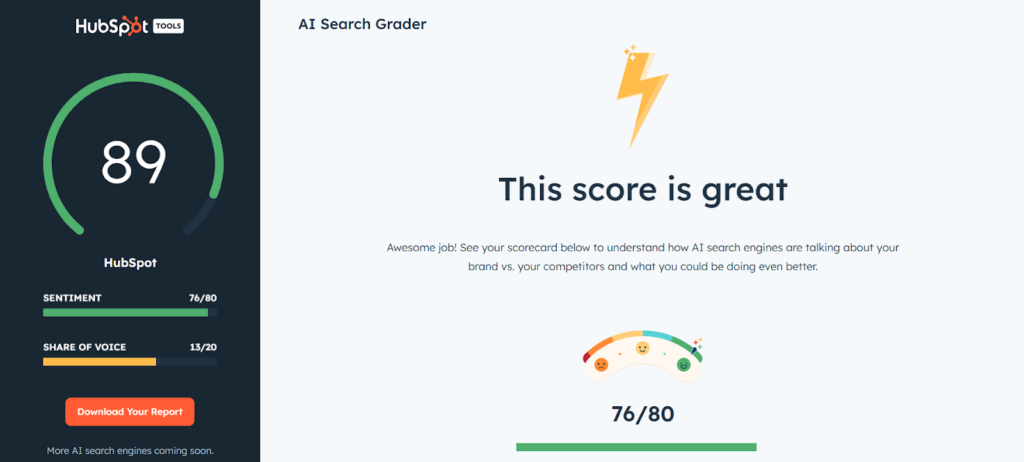
HubSpot’s AI Search Grader measures your brand’s visibility on AI-powered search engines like ChatGPT. The platform reveals whether AI search engines have your company on their radar and pinpoints the output generated whenever users look up your company through chatbots.
The platform highlights any strengths and weaknesses AI chatbots typically display about your products or services and provides sentiment scores. This is perfect for understanding how your company appears from an AI search engine’s perspective and identifying the actions needed to improve your overall reputation and sentiment.
The platform’s share of voice score also highlights the prominence of brand mention in relation to your competitors.
Pricing: HubSpot’s AI Search Grader is completely free to use.
Reviews: HubSpot is well-known for its versatility and ease of use. However, the AI Search Grader only tracks results from ChatGPT and ChatGTP-o, which is a drawback.
Key Considerations When Using AI for SEO
AI-driven content tools can play a pivotal role in enhancing your website’s SEO performance by generating high-quality, targeted content. However, before integrating AI into your SEO strategy, it’s essential to consider several key factors, such as keyword relevance, user intent, and more.
Content Quality: Ensure the AI tool delivers SEO-friendly, engaging content that adds genuine value to your audience, fostering visitor retention and social sharing.
Keyword Relevance: Select tools that are capable of identifying and integrating relevant keywords aligned with your content strategy and audience search behaviors.
Customization and Flexibility: Opt for AI solutions that allow customization, allowing you to adjust content according to your brand’s voice and message.
Integration with Existing Tools: Choose AI tools that integrate with your current SEO and content management systems to streamline workflow.
User Intent Analysis: Prioritize tools capable of analyzing user intent to ensure created content meets audience needs effectively.
Continuous Improvement: Look for AI tools offering ongoing learning and adaptation to keep pace with evolving search engine algorithms and user preferences.
Ethical Standards: Maintain ethical content creation practices by verifying originality and avoiding excessive reliance on automation to preserve human engagement.
AI-Powered Content Creation
SEO professionals are increasingly integrating AI tools to transform their strategies, particularly in content creation.
AI-powered content writing tools are incredibly versatile, capable of generating a wide range of content types. From blog posts and articles to product descriptions and social media posts, using advanced natural language processing technology.
This not only accelerates content production but also ensures uniqueness and relevance, crucial for achieving higher rankings on the SERP.
A Structured Approach to AI Content Creation
When using AI for content creation, it’s crucial to follow a structured approach for maximum efficiency and quality. Keep these key considerations in mind to make the most out of your AI tools:
Content Outline: Begin by outlining your content, including focus keywords, headers, internal and external links, and key points. This serves as a roadmap for crafting comprehensive, SEO-friendly content.
Writing the Introduction: Write an engaging hook and introduction to immediately engage readers. If you feel stuck you can use AI tools to offer multiple variations, allowing you to select the most compelling one.
Organizing and Structuring: Utilize AI tools with advanced NLP capabilities to logically organize content. These tools group related sentences and paragraphs, ensuring a coherent flow throughout the piece.
Refining and Editing: Make use of AI-powered tools like Grammarly for meticulous content refinement. They check for errors, suggest readability improvements, and provide insights into tone and structure, ensuring polished, error-free content.
Google’s View on AI-Generated Content
Google currently supports the use of AI-generated content in SEO strategies, but they emphasize the need for originality and value to readers. This means that content created by AI must offer unique insights, relevant information, and be genuinely useful to the audience.
At the same time, keep in mind that Google remains firmly opposed to low-quality content, irrespective of its origin. Whether from AI or human writers. This opposition is rooted in their commitment to providing users with the best possible search experience.
To align with Google’s standards, it’s important to utilize high-quality AI tools and ensure rigorous human oversight. This involves fact-checking, refining, and enhancing the AI-generated content to meet Google’s quality benchmarks and ethical guidelines.
AI vs. Human Writers
While AI can significantly enhance efficiency in various content creation tasks such as grammar checks, keyword suggestions, and even initial drafts, it should be viewed as a tool rather than a replacement for human writers.
AI excels at handling repetitive and data-driven tasks, providing a productivity boost, however, human writers bring creativity, critical thinking, and emotional intelligence to the table. Which are qualities that AI currently lacks.
These human traits are essential for crafting content that resonates deeply with specific audiences, capturing nuances and cultural contexts that AI might miss.
Ethical Considerations
As AI technology continues to advance, ethical considerations surrounding its use in content creation become increasingly important.
Companies must navigate the complexities of content control, to ensure that AI-generated content aligns with their brand values and messaging.
Establishing clear guidelines and standards is crucial to maintain ethical practices. Key ethical considerations include:
- Transparency: Ensure audiences are aware when content is AI-generated.
- Originality: Avoid plagiarism and content duplication.
- Human Touch: Maintain a balance between automation and human input to preserve authenticity and relatability.
- Bias Vigilance: Be mindful of potential bias in AI algorithms, ensuring fair, unbiased, and inclusive content.
Looking Ahead: AI Tools for SEO
As AI continues to revolutionize digital marketing, its integration into SEO strategies marks a pivotal advancement for businesses seeking to optimize their online presence.
These AI-powered tools streamline content creation, enhance keyword strategies, and improve SEO performance, offering major productivity and efficiency gains to organizations.
Most importantly, the ethical implications of AI in content creation highlight the critical need for transparency, originality, and inclusivity. Balancing automation with human insight is essential to ensure authenticity, and strengthening brand integrity.
Looking ahead, the evolution of AI promises further innovation in SEO, driving continuous improvement in content quality, audience targeting, and overall digital strategy.
Embracing AI as a strategic ally can empower marketers to navigate complexities with confidence, delivering meaningful digital experiences and staying ahead in competitive markets.








